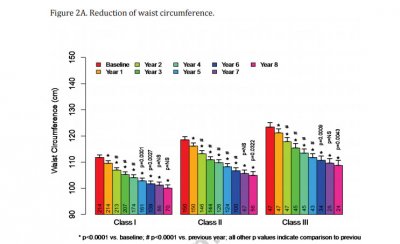Nelson Vergel
Founder, ExcelMale.com
Effects of long-term treatment with testosterone on weight and waist size in 411 hypogonadal men with obesity Classes I-III: Observational data from two registry studies
Full Paper: http://www.nature.com/ijo/journal/vaop/naam/pdf/ijo2015139a.pdf

Background/Objectives
Long-term testosterone replacement therapy (TRT) up to five years has been shown to produce progressive and sustainable weight loss in hypogonadal men. This study investigated effects of long-term TRT up to eight years in hypogonadal men with different obesity classes.
Subjects/Methods
From two independent observational registries we identified a total of 411 obese, hypogonadal men receiving TRT in urological clinics. The effects of TRT on anthropometric as well as metabolic parameters were studied for a maximum duration of 8 years, mean follow-up: 6 years. All men received long-acting injections of testosterone undecanoate in 3-monthly intervals.
Results
In all three classes of obesity, T therapy produced significant weight loss (WL), decrease in waist circumference (WC) and BMI. In patients with class I obesity, mean weight decreased from 102.6±6.4 to 84.1±4.9 kg, change from baseline: −17.4±0.5 kg and -16.8±0.4%. WC in this group of patients decreased from 106.8±7.4 to 95.1±5.3 cm, change from baseline: −10.6±0.3 cm. BMI decreased from 32.69±1.4 to 27.07±1.57, change from baseline: −5.52±0.15 kg/m[SUP]2[/SUP]. In patients with class II obesity, weight decreased from 116.8±6.9 to 91.3±6.3 kg, change from baseline: −25.3±0.5 kg and −21.5±0.4%. WC decreased from 113.5±7.5 to 100.0±5.4 cm, change from baseline: −13.9±0.4 cm. BMI decreased from 37.32±1.45 to 29.49±1.71, change from baseline: −8.15±0.17 kg/m[SUP]2[/SUP]. In patients with class III obesity, weight decreased from 129.0±5.6 to 98.9±4.8 kg, change from baseline: −30.5±0.7 kg and −23.6±0.5%. WC decreased from 118. 5±5.6 to 103.8±4.9 cm, change from baseline: −14.3±0.4 cm. BMI decreased from 41.93±1.48 to 32.46±1.59, change from baseline −9.96±0.29 kg/m[SUP]2[/SUP].
Conclusions
Testosterone therapy appears to be an effective approach to achieve sustained weight loss in obese hypogonadal men irrespective of severity of obesity. Based on these findings we suggest that T therapy offers safe and effective treatment strategy of obesity in hypogonadal men.
Full Paper: http://www.nature.com/ijo/journal/vaop/naam/pdf/ijo2015139a.pdf

Background/Objectives
Long-term testosterone replacement therapy (TRT) up to five years has been shown to produce progressive and sustainable weight loss in hypogonadal men. This study investigated effects of long-term TRT up to eight years in hypogonadal men with different obesity classes.
Subjects/Methods
From two independent observational registries we identified a total of 411 obese, hypogonadal men receiving TRT in urological clinics. The effects of TRT on anthropometric as well as metabolic parameters were studied for a maximum duration of 8 years, mean follow-up: 6 years. All men received long-acting injections of testosterone undecanoate in 3-monthly intervals.
Results
In all three classes of obesity, T therapy produced significant weight loss (WL), decrease in waist circumference (WC) and BMI. In patients with class I obesity, mean weight decreased from 102.6±6.4 to 84.1±4.9 kg, change from baseline: −17.4±0.5 kg and -16.8±0.4%. WC in this group of patients decreased from 106.8±7.4 to 95.1±5.3 cm, change from baseline: −10.6±0.3 cm. BMI decreased from 32.69±1.4 to 27.07±1.57, change from baseline: −5.52±0.15 kg/m[SUP]2[/SUP]. In patients with class II obesity, weight decreased from 116.8±6.9 to 91.3±6.3 kg, change from baseline: −25.3±0.5 kg and −21.5±0.4%. WC decreased from 113.5±7.5 to 100.0±5.4 cm, change from baseline: −13.9±0.4 cm. BMI decreased from 37.32±1.45 to 29.49±1.71, change from baseline: −8.15±0.17 kg/m[SUP]2[/SUP]. In patients with class III obesity, weight decreased from 129.0±5.6 to 98.9±4.8 kg, change from baseline: −30.5±0.7 kg and −23.6±0.5%. WC decreased from 118. 5±5.6 to 103.8±4.9 cm, change from baseline: −14.3±0.4 cm. BMI decreased from 41.93±1.48 to 32.46±1.59, change from baseline −9.96±0.29 kg/m[SUP]2[/SUP].
Conclusions
Testosterone therapy appears to be an effective approach to achieve sustained weight loss in obese hypogonadal men irrespective of severity of obesity. Based on these findings we suggest that T therapy offers safe and effective treatment strategy of obesity in hypogonadal men.
















